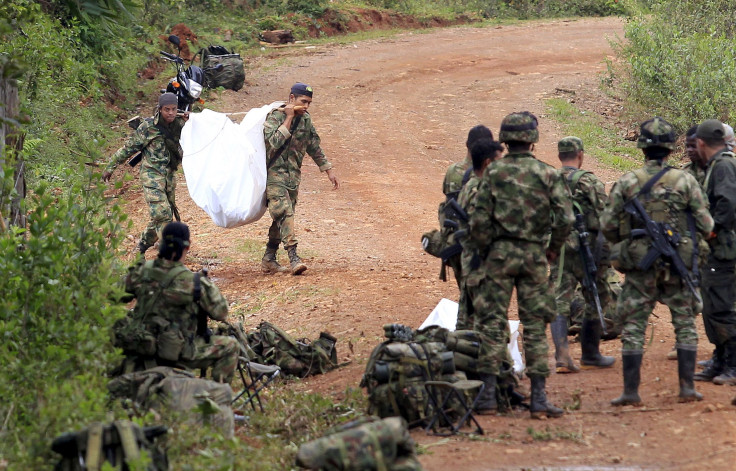Colombia FARC Conflict: Are Peace Negotiations In Jeopardy After Attack On Military?

Peace talks between the Colombian government and the leftist Revolutionary Armed Forces of Colombia (FARC) are in jeopardy following the Tuesday deaths of 10 Colombian soldiers at the hands of FARC. The incident led President Juan Manuel Santos to lift the halt on bombing FARC camps “until further notice,” the Bogota newspaper El Tiempo reported Wednesday night. The stoppage had been in effect since last month. Meanwhile, the rebels were asking the government Thursday to “keep a cool head.”
Fighting between the military and the FARC has ravaged Colombia for more than 50 years. In the course of the conflict, the rebel group has recruited child soldiers, engaged in drug trafficking and planted land mines throughout the South American country. The two sides started negotiating a peace deal in Cuba two years ago. But Tuesday’s attack in a rural area called La Esperanza (Hope), and the government's response, are threatening to upset any pact. Santos has yet to call off negotiations with the FARC, according to the New York Times. On Wednesday, the FARC said the attack on a military platoon was "necessary" and "a response to a military siege," according to the Nicaraguan newspaper La Prensa. The group didn't elaborate further.
The FARC instituted a unilateral ceasefire against the military in December, although there had been attacks prior to the killing of the 10 soldiers. A FARC commander known as Pastor Alape blamed the La Esperanza attack on the government’s unwillingness to stop combat, although he said he was unaware of the specifics of the attack, Bogota newspaper El Espectador reported.
The rebels were asking Thursday for the government to “keep a cool head” and “not take ill-considered measures that could jeopardize the progress of the talks and the maintenance of the unilateral ceasefire,” according to El Espectador. While Santos ordered the resumption of airstrikes, if unclear if any military action has taken place yet.
But a Colombian army general said the FARC “defrauded the trust of Colombians” through Tuesday’s attack. He also said the military captured a top FARC leader in Tolima, in the southern part of the country.
It’s unclear whether the military has resumed bombings, but Santos said he would take “all necessary measures to protect civilians and troops,” according to El Tiempo. "We express our deepest sympathy to the relatives of the soldiers who gave their lives in defense of the homeland. The incident was the result of a deliberate attack and violates the promise of unilateral truce," he said.
The rebels said the government should sign a truce that would bring the two sides closer to a peace agreement. “We believe that as peace talks continue it is absurd to keep killing each other," the group said, according to La Prensa.
Álvaro Uribe Vélez, Colombia’s president from 2002 to 2010 and a critic of the peace process, took to Twitter to blame the government for not giving support to the soldiers that came under fire, but he also called the FARC killers.
The FARC was founded during the Colombian civil war in the 1940s and 1950s and consists of a number of bands of guerillas, according to the United Nations. The group reportedly makes about $500 million to $600 million a year from drug trafficking, with kidnappings, extortion and “protection” taxes also contributing to the FARC’s profits, making it one of the better-funded guerrilla armies in the world, the U.N. said. One of the more extreme factions of the FARC was blamed for Tuesday’s attack, according to the Times.
© Copyright IBTimes 2024. All rights reserved.






















